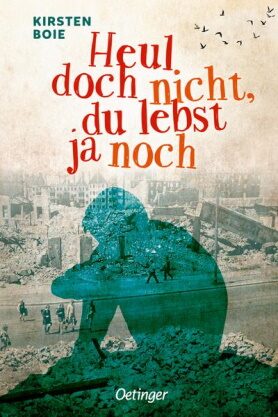Kirsten Boie
Heul doch nicht, du lebst ja noch
[Don’t Cry, You’re Still Alive]
- Friedrich Oetinger Verlag
- Hamburg 2022
- ISBN 978-3-7512-0163-6
- 192 Pages
- Publisher’s contact details
Published in Italian with a grant from Litrix.de.
Sample translations
The Aroma of an Epoch
Kirsten Boie demonstrates her immense skill as a writer in the opening scene of the novel. A boy is waiting in hideout in the ruins for the man who is bringing him food. But he has failed to appear for the second time running. Jakob doesn’t realise that the war is over and that the British occupying forces are now in charge of public life. He’s so hungry that he considers leaving his hiding place. Kirsten Boie doesn’t interpret the events for us. We are immediately plunged straight into the post-armistice period, and the story is thrilling despite its difficult subject matter. Jakob is the son of a Jewish mother. As they were being deported, she sent him away from her as if he were a devoted dog in order to save him from their fate. Forced back on his own resources, he puts his trust in a local man - and his instinct proves to be correct.
Jakob is just one of the three young protagonists whom Kirsten Boie uses to give us an insight into the era as a whole. Traute is the daughter of a baker living in straitened circumstances due to her family having been forced to take in Silesian refugees with whom they are now sharing cooking and washing facilities. Traute’s friends all burnt to death during a bombing raid. She steals a loaf of bread from her father in order to bribe the local boys to allow her to join in their football gang - but the finger of suspicion is immediately pointed at the disliked refugee family. Hermann rules the roost of the gang of boys. He prefers to hang around the streets rather than go home and face his father who lost both legs during the war. His bitterness has turned him into a resigned cynic. Kirsten Boie uses him as an exemplar of all those unreconstructed disabled war veterans who still couldn’t see why they were supposed to renounce National Socialism.
The novel is permeated by dramatic scenes. For instance, when Jakob in his desperation thinks he’s going to have to kill a girl - whom we know is Trude - in order to get his hands on a bit of bread. At moments such as this, we can hear the harsh notes of Trümmerliteratur. Heinrich Böll, too, wrote about the sudden, pressing significance of bread, and we can see why the 1950s were the age of existential questions. Kirsten Boie knows and understands her characters’ milieu. She knows about its loneliness, and the way this manifests itself in different ways in different children. And she returns to children the feelings which they weren’t allowed to have back then. In this aroma of an epoch, Kirsten Boie presents us with the world view of humans, their thoughts and, almost literally, their scent. This is the way that truly great literature works.
Translated by Helena Kirkby

By Thomas Linden
Thomas Linden is a journalist (Kölnische Rundschau, WWW.CHOICES.DE) specializing in the areas of literature, theater and film. He also curates exhibitions on photography and picture book illustration.
Publisher's Summary
Hamburg, June 1945. The city lies in ruins. Traute, Hermann and Jakob live smack in the middle of it all. But Jakob calls himself Friedrich, as he doesn’t want anyone to find out that he’s a Jew. Once Hermann does find out, he doesn’t want anything more to do with him. Guilt, truth, fear and rage are the central themes of this book, the youthful protagonists of which are tied to each other through the terrors of war and Nazi rule, although they repeatedly experience more positive moments as well.
(Text: Friedrich Oetinger Verlag)
